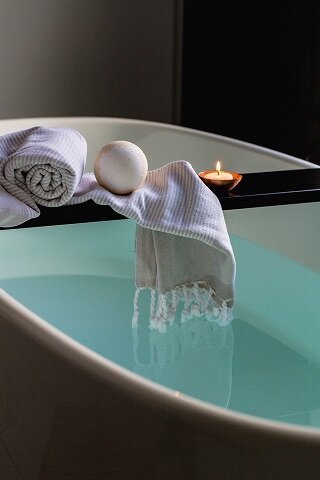Supercharge your sleep
Sleep
Sleep, is not a “nothing” state. There’s a lot going on, and it’s imperative to health!
During sleep our body recovers, memory is consolidated, metabolic waste from the brain is removed and the immune system fights harder.
Sufficient sleep improves mood and focus the next day.
Regular quality sleep is also associated with healthier body weights as well as long term health effects such as heart disease, mental illness, Alzheimer’s and some cancers.
As we discussed in our previous article, sleep is regulated by two main processes in the body. The first is the natural need to sleep after wakefulness. The second is the circadian rhythm.
Where Do We Go Wrong?
So if there are two processes which seem pretty straight forward, where do we go wrong?
Our circardian rhythm naturally clicks through approximately 24 hours before restarting. But it also takes information from environment cues, known as zeitgebers.
Routine provides a schedule for the zeitgebers, and when routine is disrupted, zeitgebers can be all over the place, “confusing” our body clocks.
In the previous article, we talked about common routine disruptions and some ideas to work through them.
Today, we’ll go through particular zeitgebers and how they impact sleep.
But if you’re not that interested in the how, you can skip straight to the practical tips using our:
Think you know what’s important? Test your skills using our quiz.
Don’t cheat- Do this before you read on!
Ingredients of a Good Sleep
Light
Arguably the biggest influence on our sleep, light through the eye directly feeds information to our Boss Body-clock in the brain (The SCN), synchronising our circadian rhythm to 24 hours.
In addition to providing the body clock information, light stimulates the production of melatonin, and provides information about when it should be released. Melatonin is our sleepy hormone. If there is light exposure when there shouldn’t be, there won’t be a release of melatonin!
Light also stimulates the release of Dopamine, which helps us wake up in the morning.
Vitamin D deficiency is also associated with lower sleep quality, with sunlight being essential to Vitamin D levels, so try to have some time outside each day!
Timing
Research has shown that respecting the natural rhythms, through a consistent sleep routine, sleep and wake time, supports the regularity of the circadian rhythm in optimal sleep.
If you have to make a sacrifice occasionally, wake time is more important than sleep time.
It’s also important to consider your chronotype. This is the time your circadian rhythm is synced naturally, it’s individual to you. There have been categories created for averages and you can do a quiz here to find out, or you can ask yourself: “What time do I wake up without an alarm, on a day without commitments?”
Stimulants and Substances
Stimulants such as caffeine and nicotine, increase wakefulness through various effects on chemicals in the brain.
Caffeine spikes approximately 30 minutes after consumption. The caffeine can stay in the bloodstream for up to a few hours, but how long it stays in the system is individual, usually depending on genetics. Therefore, it can impact your ability to get to sleep if you take it too late.
If you NEED caffeine to wake up in the morning, this would indicate poor sleep, which may very well be a result of caffeine the day or days before! What better time to test your caffeine tolerances than during the coronapocalypse?
Nicotine affects sleep quality as well as duration. The stronger the addiction, the less amount of sleep you’re likely to get, usually waking you up earlier!
If you’re trying to quit, better sleep quality has been shown to improve quitting success. So, work on these other sleep hygiene tips to help!
Alcohol, of any amount 2-4 hours prior to bed decreases the quality of your sleep, with binge drinking having worse effects. It may help you get to sleep, but once you’re asleep and the alcohol metabolises further, sleep becomes lighter.
Diet
Yep, diet effects your sleep too.
Firstly, some foods and drinks, even chocolate, have caffeine in them, which we’ve already discussed.
Speaking of chocolate, high sugar foods are also understood to impact sleep quality, especially soda drinks.
Consistent with usual health recommendations, a well-balanced diet is associated with better sleep. Lack of variety of carbohydrates, fats, fiber, and protein is correlated with poor sleep.
The fuel we provide our body forms the building blocks of, pretty much everything. Considering sleep, there are various ingredients, sourced from food, that are required to produce melatonin and other chemicals in the brain. There are specific foods that have higher ingredients needed to make these molecules, they’re listed in the Checklist.
Being over-weight or under-weight are both also associated with poorer sleep quality.
Exercise
Keeping active throughout the day is associated with better sleep.
So, try to get the recommended exercise levels for general health which is: at least, 30 minutes of moderate aerobic exercise, 5 times per week and 2-3 strength training sessions. Although, 1 hour of exercise has superior effects on sleep.
The sweet spot for exercise and sleep seems to be about 4-8 hours before sleep as it helps reset body temperature and stimulates useful hormones and neurotransmitters. While moderate-high intensity exercise supports sleep, HIIT training in particular has been shown to have superior benefits for sleep.
However, exercise is a stimulant so avoid if too close to bedtime!
Stress
Stress is also a stimulant!
Cortisol, our stress hormone, can impair sleep quality by keeping us awake. So try to figure out some strategies to actively manage your stress. Options include talk therapy or debriefing with a friend, exercise, meditation, and other relaxing activities like a bath, a book or getting creative.
Routine
A regular daily routine assists in regular Zeitgerbers throughout the day.
You should also consider the timing of other activities during the day. For example, Cognitive Activities such as work, can be a Zeitgeber related to an earlier part of the day (not just before bed!).
A particular sleep routine in the evening can help provide your body with unconscious cues that bedtime is coming. Your routine should be consistent. It could include wind-down activities such as stretching, calming music or herbal tea, and a strong aversion to anything stimulating activities. Find what works for you!
Sleep Environment and Comfort
We’ve already discussed light, so it might come as no surprise that the darker the room the better.
A quiet space is ideal, but there’s also cool new research about how environmental noise and sounds interrupt sleep. Particular sound waves can decrease or enhance sleep quality. Sonic Sleep is a company researching this and they’ve produced a mobile app that works to block out the specific sounds around you.
Temperature is another factor to consider. You should be comfortable, not too cold, not too hot. Research supports a room temperature of 26-28 (without a blanket!).
Sleep expert, Dr Dan Gartenberg, recommends that bed partners, use their own blankets, to maintain a comfortable temperature without interruption.
You should feel comfortable in your own bed, with linen, mattress, and pillows to your liking.
Pain and muscle tightness may also increase discomfort. Stretches before bed and during the day as well as stress relief may help in this situation.
Sweet Dreams!
Biara Webster
Exercise Physiologist & Health Writer
REFERENCES Maingret, N., Girardeau, G., Todorova, R. et al. Hippocampo-cortical coupling mediates memory consolidation during sleep. Nat Neurosci 19, 959–964 (2016). https://doi.org/10.1038/nn.4304S.-Hakki Onen, Fannie Onen, Circadian Sleep Disruption and Cancer Risk, Chronobiol Med. 2019;1(4):137-143. Published online December 31, 2019, DOI: https://doi.org/10.33069/cim.2019.0022 Jung, Y.S., Chae, C.H., Kim, Y.O. et al. The relationship between serum vitamin D levels and sleep quality in fixed day indoor field workers in the electronics manufacturing industry in Korea. Ann of Occup and Environ Med 29, 25 (2017). https://doi.org/10.1186/s40557-017-0187-7Kathleen E. West et al. (2011) Blue light from light-emitting diodes elicits a dose-dependent suppression of melatonin in humans, Appl Physiol 110: 619– 626, 2011. Christine E Spadola, Na Guo, Dayna A Johnson, Tamar Sofer, Suzanne M Bertisch, Chandra L Jackson, Michael Rueschman, Murray A Mittleman, James G Wilson, Susan Redline, Evening intake of alcohol, caffeine, and nicotine: night-to-night associations with sleep duration and continuity among African Americans in the Jackson Heart Sleep Study, Sleep, Volume 42, Issue 11, November 2019, zsz136, https://doi.org/10.1093/sleep/zsz136Irish et al., The Role of Sleep Hygiene in Promoting Public Health: A Review of Empirical Evidence, Sleep Med Rev. 2015 August ; 22: 23–36. doi:10.1016/j.smrv.2014.10.001 https://www.foodstandards.gov.au/consumer/nutrition/Pages/Sugar.aspxhttps://www.sleep.org/articles/what-is-tryptophan/Anjum, I., Jaffery, S. S., Fayyaz, M., Wajid, A., & Ans, A. H. (2018). Sugar Beverages and Dietary Sodas Impact on Brain Health: A Mini Literature Review. Cureus, 10(6), e2756. https://doi.org/10.7759/cureus.2756 St-Onge MP, Mikic A, Pietrolungo CE (2016), Effects of Diet on Sleep Quality, Adv Nutr. 2016 Sep 15;7(5):938-49. doi: 10.3945/an.116.012336. Katri Peuhkuri⁎, Nora Sihvola, Riitta Korpela (2012), Diet promotes sleep duration and quality, N U T R I T I O N R E S E A R C H 3 2 ( 2 0 1 2 ) 3 0 9 – 3 1 9, doi:10.1016/j.nutres.2012.03.009David J. Kennaway (2017) Are the proposed benefits of melatonin-rich foods too hard to swallow?, Critical Reviews in Food Science and Nutrition, 57:5, 958-962, DOI: 10.1080/10408398.2014.962686Chennaoui (2015), Sleep and exercise: A reciprocal issue?, Sleep Medicine Reviews 20 (2015) 59e72Vollmer and Randler (2015) Sleep duration and chronotype in adults in Côte d’Ivoire: influence of gender, religion and age Journal of Psychology in Africa · August 2015Irish et al., The Role of Sleep Hygiene in Promoting Public Health: A Review of Empirical Evidence, Sleep Med Rev. 2015 August ; 22: 23–36. doi:10.1016/j.smrv.2014.10.001The effects of programmed air temperature changes on sleep quality and energy saving in bedroom , DOI: 10.1016/j.enbuild.2016.08.001Susanne Urlaub (2015), The Influence Of The Indoor Environment On Sleep Quality, Healthy Buildings Europe, Eindhoven, The Netherlands












